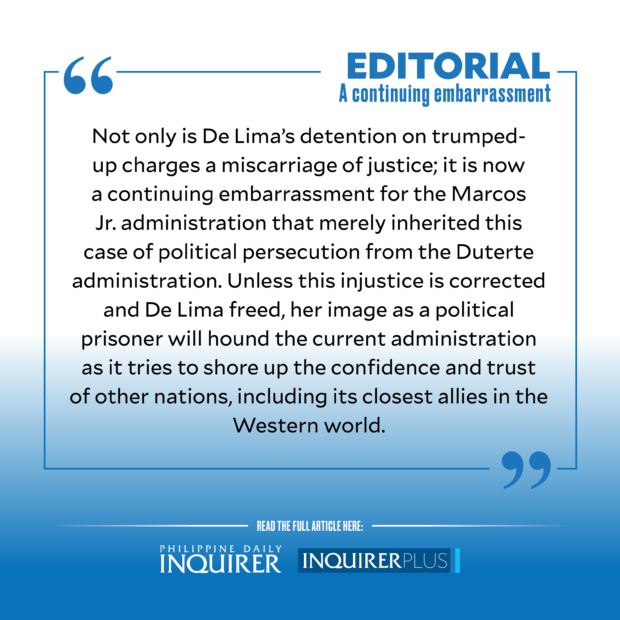
The day prior, the Philippine National Police prevented the visit, saying that aside from COVID-19 cases at its headquarters in Camp Crame, the US lawmakers did not have the permission of the courts handling De Lima’s alleged drug cases.
The US delegation was led by Sen. Edward J. Markey, chair of the US Senate foreign relations subcommittee on East Asia and Pacific, who has been consistently calling for De Lima’s release since she was detained in 2017. He was joined by District Representatives Alan Lowenthal and John Garamendi of California, Don Beyer of Virginia, and Aumua Amata Coleman Radewagen of American Samoa.
Markey, a Democrat from Massachusetts, was among the senators banned from entering the Philippines in 2019 by then President Duterte after they sponsored a US travel prohibition against Philippine officials who had a role in De Lima’s case.
The potential crisis was somehow diffused when the US lawmakers made a courtesy call on President Marcos Jr. in Malacañang later on Thursday afternoon. It was not known if the foiled visit to De Lima was discussed, but the US embassy said lawmakers also met with Justice Secretary Crispin Remulla.
On Friday, the US lawmakers were finally able to visit De Lima after Muntinlupa City Regional Trial Court Judges Abraham Joseph Alcantara of Branch 204 and Romeo Buenaventura of Branch 256 granted the “extremely urgent motion” filed by her lawyers on behalf of the US delegation. But the courts issued a gag order, preventing De Lima from making any comments about the visit. No media coverage was allowed, either.It was later revealed from Judge Alcantara’s order that Markey’s office wrote a letter to PNP chief Gen. Rodolfo Azurin Jr. as early as Aug. 9, asking permission to visit De Lima, but that “… despite follow-ups, the PNP has not timely responded to the request.” De Lima herself said the visit was requested in advance, through a US embassy note verbale sent to the Department of Foreign Affairs and forwarded to the PNP.
But why was the PNP so reluctant to allow the visit to the former senator? Did the police fear that seeing De Lima’s shameful condition in detention would add fuel to the international condemnation of her continuing ordeal?
Back in May, Markey and five other US senators issued a joint statement calling on the Philippine government to drop the charges against De Lima and release her after convicted felons lined up as witnesses by the Duterte administration recanted their allegations against her one after the other.
The US delegation’s visit underscores how the De Lima case can become a thorn on the side of the Marcos Jr. administration if it does nothing to correct the misuse of the justice system by its predecessor.
It is not only the US lawmakers who are pushing for De Lima’s release. Foreign ambassadors always ask him about the cases against De Lima, Remulla recently told a Senate hearing, adding that he did not know what to say “because I don’t know what stages these cases are.” This is puzzling for a justice secretary, who is supposed to be in command of all state prosecutors handling the cases against De Lima.
In June, after several witnesses against De Lima recanted, then DOJ Secretary Menardo Guevarra ordered a review of the pending cases. But the panel of prosecutors, he said, advised him that “there is a good reason to continue the active prosecution” of the staunch Duterte critic. Does that order still stand?
In the face of the recantation and the Ombudsman’s ruling in January dismissing the bribery charges against De Lima and her former aide Ronnie Dayan, shouldn’t Remulla order an independent review of the two pending drug cases and direct the prosecutors on how to proceed? Failing that, the decent thing is for the DOJ to resist being used as a tool for political persecution, which is what the cases against De Lima are all about: a retaliation for her investigations of the Davao Death Squads and the Duterte drug war.
When the US delegation returns home, they can be expected to come up with a report on De Lima’s situation and apply pressure on US decision-makers. Any adverse report could have repercussions on Mr. Marcos’ US visit next month to address the United Nations General Assembly in New York, and on his future visits to Washington.
Not only is De Lima’s detention on trumped-up charges a miscarriage of justice; it is now a continuing embarrassment for the Marcos Jr. administration that merely inherited this case of political persecution from the Duterte administration. Unless this injustice is corrected and De Lima freed, her image as a political prisoner will hound the current administration as it tries to shore up the confidence and trust of other nations, including its closest allies in the Western world.